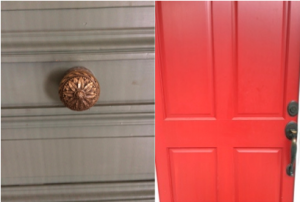Annabel Monaghan's Blog, page 9
November 19, 2014
Motion to Limit the Use of the Word “Amazing”
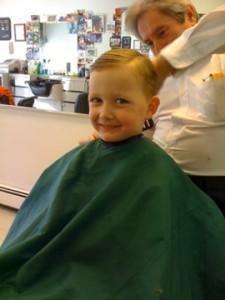 Adorable, but not amazing.
Adorable, but not amazing.Being a contestant on a reality TV show is an amazing journey. I know this because, when interviewed, each and every one of those contestants (win or lose) says what an amazing journey it’s been. I’ve never been on one of those shows, so I’m going to take their collective word for it.
When I was watching the election returns last week, I was shocked to find that the conceding candidates had also, in fact, just completed an amazing journey. They said it again and again, like they were standing next to Ryan Seacrest. The journey was their decision to run for office, the development of a platform and a constituency, ending in a loss. Interesting? Sure. Amazing? No. There were only two ways the election could have gone. But again, I’ve never run for office.
Here’s what I have done: I’ve been married with kids. So when I see my Facebook friends wishing their amazing husbands a happy anniversary, I take pause. When I see “Happy Birthday to the most amazing 9 year old in the world”, I think what gives? Is everybody’s family amazing but mine? What, I wonder, is so amazing about these people?
Just to be clear: Amazing (adj.) Causing great surprise and wonder. Astonishing.
I picture these husbands swooshing into the bedroom in tights and capes. Maybe they clean the gutters dressed like Liberace and spinning plates in one hand. Amazing connotes a bit of flash. It suggests that an unforeseen “ta-da!” is just around the corner at all times. This kind of thing almost never happens in my house. My husband and children are good, even excellent, but I just can’t remember the last time any of them pulled a rabbit out of a hat.
My husband is not a “ta-da!” kind of guy. His superpower is his ability to make the perfect joke in the most tense possible situation, thereby returning all participants to equilibrium. The value of this power cannot be overstated, and the first few times I experienced it, I have to admit that I was amazed. But now it happens so regularly that there’s probably another word for how I feel about it. After the 8th or 9th time Superman stops a train from running over your girlfriend, you are no longer amazed. Maybe it’s “grateful” we’re looking for?
 Mighty, yes.
Mighty, yes.Actually my favorite thing about my family is its un-amazingness. They are consistent. The kid who says he’ll be home at midnight, walks through the door at midnight. I know what to expect. They wake up, get dressed, eat bacon, and leave their stuff out in the rain in such a consistent matter that I’d be astonished if they didn’t do these things.
After 18 years, if my husband was constantly amazing me, I think it would kind of get on my nerves. “Look honey, I painted a reproduction of the Mona Lisa on our front door! Check me out, I’m entering the house through the chimney today!” That’s amazing, honey. Now stop it!
Same goes for that amazing children’s movie you just saw. I understand that it was good, and that you liked the music and whatever little talking animal they threw in. But were you really amazed that it all worked out in a happily ever after fashion? Were you amazed the princess didn’t end up living alone, hoarding mayonnaise jars and caring for cats? Really?
It’s clear why I don’t wish my husband happy anniversary on Facebook, apart from the fact that he’d never see it. We’ve gotten to a place where it’s hard to talk without hyperbole, because the truth seems a little dull. Happy anniversary to my consistently good husband! That would be the truth. Thanks for entering the house through the front door like you’re supposed to. What would people think?
I’ll tell you who’s amazing: The Amazing Spiderman. It’s in his name. He can shoot webs out of his wrists and use them to get around. He can be glum and sort of untalkative, but still keep Mary Jane’s interest. I’ve seen him kiss upside down! That guy, and only that guy, is amazing.
The post Motion to Limit the Use of the Word “Amazing” appeared first on Annabel Monaghan.
November 5, 2014
Grasping at Sanity as the College Admissions Process Creeps Up
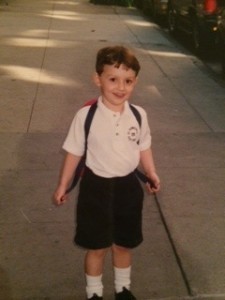
First day of pre-school, 2001
I always wondered why parents went so mental when their kids were applying to college. I tended to give them a knowing nod, the “knowing” part being that I knew there was no way I was ever going to act that. If I asked a question about where their kid was applying, they would reply with a practiced, “we are not discussing it,” like they were members of a covert ops team. As with all other stages of raising children, you just don’t get it until you get there. From where I now sit, next to a son who is perched on the edge of 11th grade, I admit there’s a good chance I’m going to go a bit mental myself.
I take solace in the fact that the same parents who go berserk during their kid’s senior year are completely Zen a year later. They say things like, “Oh it all works out” and “There’s a great school for every student.” And I notice that their collective hair is starting to grow back where they’d previously been tearing it out. I just want to fast forward to that stage. I want to grab hold of that Zen and cloak myself in it for the duration of my child’s college admissions process.
Unfortunately, I have a history of going a bit overboard. Fact: when I was sixteen and going through the college admissions process myself, I completely lost my mind. I applied to a dozen colleges and sucked up to every admissions officer that visited my school. While I’m being honest, let me just say that cookies may have changed hands. When decision time came, I camped out on the curb waiting for the mailman. The first envelope to arrive was a rejection. From my safety school.
Everything went silent.
And so began a period of time when I questioned my basic worth as a human being, the possibility of my amounting to anything at all, and my right to breathe the air on this planet alongside the “accepted ones.” It’s disturbing now to think of how deeply I internalized this rejection. It was like I could quantify my lack of value based on the politely worded language in that rejection letter.
Long story short, I got into another college and pinned my self-worth on their approval. Phew! That was close!

See, I really did get in!
Recalling this dark time, why on earth would I think I wouldn’t go nuts when my child goes through this process? The sane part of parents knows that our children are wonderful, complex beings, with value that is infinite and separate from the whims of college admissions officers. Our kids will thrive in any number of environments and grow up to be bigger, more knowledgeable versions of who they already are. The crazier side of us worries that this is somehow about us, that our child’s admissions results will be a report card that either rewards us for driving to violin lessons or penalizes us for all those hours spent in front of The Family Guy.
One thing I hope to remember, besides the fact that this is not about me, is the fact that it’s harder now. I don’t know how it’s possible that so many things can be easier when this thing is so much harder, but it is. The ugly truth about my generation is that few of us would be accepted to our alma matters today. I don’t care if your first name’s Carnegie and your last name’s Mellon, you’d probably be waitlisted in 2015.
This adds to our stress because we know that our kids have to be twice as smart and accomplished as us we were. I do alumni interviews for my college, and these kids come at me with their state science award and their orchestra compositions and the import / export business they started while volunteering in Africa. I nod as if to say, “Yeah, I did that too.” And by “that” I mean I went to the beach a lot.
I’m not quite engaged in the college thing yet. I’m looking at it from a reasonably safe distance, clutching the words of those Zen parents like the hand of a child who’s about to run out into traffic. I write this as a reminder to myself and to my children that life is not pass / fail, and that it is so much more often circular than straight. And that the smartest person I know attended a college with a 73% acceptance rate.
Stay tuned.
October 10, 2014
In the Age of the Selfie, Do We Still Need Picture Day?
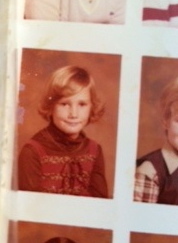
The most awkward moment of 1977
When I had my first son, someone gave me one of those School Days photo frames to house all the school pictures I would collect over the years. It has twelve openings for photos from K through 11, and then a big celebratory photo for a senior portrait. I tend to be fairly goal oriented, so I liked the idea of having a way to visually track my progress while my kids go through school.
In reality, that frame is the most depressing thing in the world. And I don’t just mean the dwindling empty spaces that show me how many years I have left, like an X’ed-off calendar on a prisoner’s wall. The depressing part is the photos themselves, my kids against an artificial background looking like they’re under duress. If I wanted a collection of thirteen awkward photos of my kids smiling nervously at a stranger, I’d just wait for the mug shots to roll in.
I imagine that school photos made sense many, many years ago. My grandparents and great grandparents were seldom photographed except at school or at their own weddings. They did not live in a culture where parents watched every school play through the back of their smart phones. And they certainly didn’t turn their cameras on themselves to commemorate every social gathering, every meal, every outfit change. In a pre-selfie world, I can see why school photos were necessary to commemorate the passage of a year. I’m not sure we need them now.
At last count, I have nearly a zillion photos of my kids. There are so many that I seldom go to the trouble of printing one out and putting it in a frame. My favorites feature my kids looking like kids: outside, laughing, and a little dirty. When Future Me gets around to printing out the best of these photos and putting them into carefully assembled photo albums, I’m pretty sure the annual school photo won’t even make the cut.
With your first child, you get sort of excited about their being professionally photographed. When the order form comes home, you pick the A package that costs $54, the one that includes the 8×10 and six 3x5s and enough wallet sized photos for all of your friends. Because, really, who doesn’t want to stuff her wallet full of photos of other people’s kids? You maybe spring for the retouching, the personalization on the back, and the refrigerator magnet so you are sure that the photo ends up in multiple rooms.
Smartly, the photo company asks you to commit to this purchase before you actually see the photo. Your kids are so cute, how could they take a bad photo? The picture day photos of my children are honestly the worst photos that they take all year. Sit on this stool, lean a little forward, tilt your head up toward the ceiling while keeping your eyes on me, the stranger who just combed your hair in a direction it’s never gone before…. Say cheese! They often end up with an expression that suggests they’ve recently been punched in the kidneys.
I wised up by the time my second son was in school. I ordered the Z package which is maybe $15 and comes with one individual photo for us to laugh about and also the class photo. (I have to admit I love the class photo. It feels like a historical document. I keep them in case one of my sons ends up marrying the girl in the third row or in case kid making the funny face ever runs for President.)
One year when my third son was in pre-school I brought him to class on picture day, and the teacher gasped when she saw him in his customary Yankee t-shirt and basketball shorts. “Oh no!” she cried. “I forgot to remind you it was picture day!” I knew darn well it was picture day, and I thought he looked pretty good. I wasn’t about to add a starchy collar and a necktie to the awkwardness of the event. I didn’t spring for the refrigerator magnet that year either.
September 29, 2014
Newsflash: Things Could Be Worse
 People seem to really like to talk about the good old days. Remember when kids played outside and could shake your hand because they weren’t playing Angry Birds? I remember those days too, but here’s what I also remember about growing up in the 70’s: driving down the freeway, inhaling that first morning puff of second hand smoke (I still like the smell), and watching my mom swerve a bit because the driver of the car in front of us had chucked the remainder of his McDonald’s meal out the window. This was such a common experience that we didn’t even flinch. My mom would just run the windshield wipers a bit and be done with it. I don’t know if this was even illegal in 1975.
People seem to really like to talk about the good old days. Remember when kids played outside and could shake your hand because they weren’t playing Angry Birds? I remember those days too, but here’s what I also remember about growing up in the 70’s: driving down the freeway, inhaling that first morning puff of second hand smoke (I still like the smell), and watching my mom swerve a bit because the driver of the car in front of us had chucked the remainder of his McDonald’s meal out the window. This was such a common experience that we didn’t even flinch. My mom would just run the windshield wipers a bit and be done with it. I don’t know if this was even illegal in 1975.
So now every time I hear someone say how we are all going to hell in a hand basket, that image crosses my mind. I see a chocolate milkshake dripping down the windshield, carrying with it a discarded pickle and maybe an empty ketchup packet. Sure, things aren’t perfect today, but the fact that we don’t do that anymore shows that we have the potential to improve.
The freeway of my childhood was literally lined on either side with garbage, not just lunch remains but sofa cushions, newspapers and tire irons. Traffic pushed the garbage onto the shoulder the way plows form snow banks. I honestly never thought anything about it.
Then at some point in elementary school things changed. It became unpopular to be referred to as a litterbug. I am still not sure if this is an entomological term for an actual bug who chucks his Big Mac wrapper out the window, but being a litterbug was a worse social stigma than having the cooties. Naturally I’d had my cootie shots, but in 1978 there was no inoculation for being a litterbug.
My school had a contest to see who could collect the most pop-tops off of the ground around our community. You might recall that in the early days of Tab, sodas had pop-tops that came all the way off. It was glamorous to pop open your Tab and then drop that little piece of metal into the tall grass, where it would later choke your dog or cut your foot. I collected literally hundreds of pop-tops off my school playground and the surrounding few streets, and I wasn’t even really trying that hard.
My mind is blown by how far we’ve come, that this same careless generation has managed to change its habits. The early days of recycling required so much personal retraining that I wondered if it would ever catch on. You mean I am going to have to separate my garbage? Like, touch it? Are you kidding? But now we design our kitchens around the task, and the separating is unconscious. My kids would sooner eat cauliflower than put a plastic bottle in the regular garbage.
Plastic bags are illegal in our town. You can’t even buy a plastic bag with a permit and a four day waiting period, that’s how illegal they are. Carrying reusable bags is a major behavioral change, and we embraced it because it involved a bit of social pressure. If I forget my bags and have to take the paper ones offered by the store, I am awash with the childhood stigma of being a litterbug. We have even repurposed the phrase “walk of shame” to describe the trip through the parking lot carrying these wasteful bags.
I wonder if my kids can even fathom the madness of my childhood. Their generation is miles ahead of us and my hope is that they will keep us out of that quickly descending hand basket. They learn songs at school about the subtleties of recycling different types of paper: “If it’s grey, throw it away; if it’s brown, pass it down.” That really beats “If you’re done with your fries, just chuck them out the window.” Which doesn’t even rhyme. I think there’s hope for us yet.
September 12, 2014
House Swap
I have just returned from my very first house swap. It was an unbalanced sort of exchange in that my family stayed in my friend Paige’s apartment in Paris for two weeks, and she stayed in my house in Rye for three days. We had more contact during that time than we’ve had in the past 25 years, asking questions about appliances and sharing photos of our families in the other’s town. (I sent photos of my family at the Eiffel Tower; she sent photos of hers at Bar Taco. I told you this was unbalanced, right?) But more than anything, being in each other’s spaces and trying on each other’s lives makes me feel like we’ve actually spent time together. It’s uncanny how much a home tells you about a person.
Whenever people are coming to my house, I do the standard mad dash. I stash the papers in a cabinet or two. I collect armfuls of socks and take them to the basement. I stack unsavory reading material, stray shoes and golf balls on the back stairs. I clean up in a ‘please don’t open any drawers or look at any one surface for too long’ kind of way. If people don’t stay long, they generally leave thinking I’m running an orderly ship. This may be why I don’t usually invite people to stay for very long.
I straightened up my house in this way before I left for Paris, excited to be going on vacation and hyper focused on arriving at the airport my customary three hours before flight time. It wasn’t until I turned the key at Paige’s picture perfect apartment that I started to wish I’d given my place another once over. We were going to learn a lot about each other, and I’d left a lot of myself lying around.
Paige and I went to high school in Los Angeles together. We were great friends, but due to geography we haven’t seen much of each other since then. We now keep in touch in a Facebook kind of way, meaning that we mostly hear about each other’s good days. Neither of us ever posts a photo of vomiting children or personal meltdowns. I would certainly never post a photo of my three kitchen junk drawers.
Paige is preserved in my mind as the California girl that the Beach Boys were always singing about, eternally 18 and always a little sandy. That may be why the reality of her home hit me so hard. It was a shock to learn that in France they don’t have mail. Or dust. Or socks. By the third day I was frantically opening cupboards looking for signs of weakness, or at least a few broken crayons.
With horror I pictured Paige in my kitchen, opening any number of cupboards to find tax receipts and dead batteries thrown together like a poorly conceived blind date. My opened mail sits in neat-ish piles, with story ideas scribbled across the top. Phrases like “Madman takes over sanitation department” or just “slow, untraceable poison” are everywhere. I’ve not scratched the surface of my domestic quirkiness, but standing before Paige’s artfully displayed canisters of coffee, tea and biscuits, I felt a little naked. Yes, Paige, this is what’s become of me.
I was equally shocked to find out what’s become of Paige: Namely, she’s gone French. In her kitchen are handmade mother’s day cards that read “Bonne Fête des Mamans,” or something more correct than that. She has a bowl full of shallots and a bottle of truffle oil. Shallot and truffle oil cooks take sauces seriously. They care deeply about subtle flavor and are usually, among other things, French. Flipping through a cookbook called Qu’est-ce qu’on Mange Ce Soir? I thought, “She’s really a long way from the beach volleyball circuit.”
I’m sure she was just as surprised that I’ve turned into a suburban New Yorker. I buy coffee beans in a three-pound bag and eggs four-dozen at a time. I have paper towels to get me through two seasons, because that’s the only way I know how to buy them anymore. I wondered if she was dying to ask, “Why do you have so many televisions?” as much as I was dying to ask, “Why do you have so many scarves?”
As I fell asleep in her bed every night, I’d run my eyes over her bookcase and happily note that we have read the exact same books during the past decade. I hope that she noticed too. As strange as it sounds, the highlight of my vacation was catching up with my old friend.
August 27, 2014
The Evolution of Summer, As Told by My Tan Lines

Okay, not actually my arm.
Like everyone else on earth, summer meant everything to me when I was a kid. I can still remember the feeling of the last day of school when the nuns made us take our desks outside and wash them. That hint of sunshine and welcome splash of water in my saddle shoes was a preview of things to come. Soon I’d be staring into the wide open space of summer: no have-tos and no ankle sock tan lines.
My mom had a rule about my having to be engaged in one activity every summer. During the summer that I was fourteen, that activity was taking tennis lessons. I know, this may come as a shock to those of you who have seen me play tennis. Is it possible, you wonder, that this person has ever had the benefit of professional instruction? Of course not. By “taking tennis lessons” I mean that my mom dropped me off at the tennis courts on her way to work, and I waited until she’d left the parking lot before hopping the Wilshire Boulevard bus to the beach. Once there, rotating the position of my towel according the movement of the sun was my only real have-to. She never noticed that my tan lines looked more like Baywatch than Wimbledon.
Later, when I got my first full time job, complete with health insurance and the makings of an ulcer, they told me I was entitled to two weeks vacation. Two weeks sounded pretty good for, say, Christmas vacation, but I was alarmed to find out that they meant for the whole year. And then I found out that those two weeks didn’t kick in until after I’d worked a whole year, straight. That was the first year I had no tan lines, and a vitamin D deficiency.
So when I scored the stay at home mom gig, I figured I had it made. I’d be on a kids’ schedule with summers and spring break! All of that childhood freedom would be mine again. Long lazy, sundrenched days, lemonade in a crystal pitcher on a porch. Me, in a white sundress that would somehow stay white after a whole day of frolicking. Being a mom is practically all vacation if you think about it.
I realized my miscalculation right away. But I still try to steal back that summer feeling, that impending freedom. I decide which book I’m going to read first and outline elaborate writing projects. I buy new sunscreen and identify a spot on the beach where my blood pressure will hit dangerously low levels. This dream feels so obtainable, all I have to do to get there is drive my kids around a bit.
That task looks a bit like this: I drop one child at camp at 8, come home to feed another and drive him to camp at 9. I come home in time to eat breakfast myself and consider starting my summertime reverie but realize there’s not enough time before I need to wake and feed the oldest one whose work starts at 11. Ah, 11 o’clock, time to start my day… though the 8 o’clock kid needs to be picked up some days at 12, some days at 2. Throw in a 3pm pick up for the 9 o’clock kid, 5:30 dinner and a basketball game at 6:30…
And I’ve just explained why moms wander around for most of July saying, “I feel like summer hasn’t really started yet.” Or why people keep asking me, “Where have you been?” In my car! You?
I’ve also just explained my peculiar tan lines. I have a driver’s tan, just on my left arm and the left side of my face. It’s half a tan, something out of a Batman movie, which seems about right because moms get half a summer vacation. Half good and half driving.
The hard truth, as I am finally coming to accept it, is that being a mom is really just like any other job. You don’t get three months of vacation. The have-tos remain and sometimes multiply, so the best you can do is just enjoy the hard work that summer eliminates: finding people’s mittens, shoveling the driveway, talking about homework, and avoiding volunteer jobs.
At this stage of life, the only way to create vacation is to actually take it, to pull my children out of their lives and place them somewhere where none of us has any have-tos. I am writing this from my actual, legit summer vacation, which I define as eleven days in a place where I do not have access to a car. And I’m trying to turn the right side of my face to the sun, just to even things out.
July 22, 2014
A One-Step Guide to Packing Your Kids’ Stuff For Vacation (Step 1: Don’t!)
 When you give birth to a child, that child entrusts you with a thousand small tasks that are necessary for his survival and comfort. It’s important to remember that these tasks are on loan, that we need to eventually give them back to the child for our own survival and comfort. The bathing thing reverts back to them. The shoe-tying thing reverts back to them. I delight in each of these milestones, but none has felt better than letting my kids pack their own stuff for vacation.
When you give birth to a child, that child entrusts you with a thousand small tasks that are necessary for his survival and comfort. It’s important to remember that these tasks are on loan, that we need to eventually give them back to the child for our own survival and comfort. The bathing thing reverts back to them. The shoe-tying thing reverts back to them. I delight in each of these milestones, but none has felt better than letting my kids pack their own stuff for vacation.
I should have learned my lesson when I was first married, the time my husband was running late and asked me to pack his bag for a wedding. Instead of a suit, I accidentally grabbed a tuxedo, and he spent the weekend overdressed, annoyed and repeatedly mistaken for a waiter. On the bright side, he has never asked me to pack for him again. I believe this is what they refer to as a self-correcting problem.
But when I had kids, I found myself once again in the capacity of packing other people’s suitcases full of all the wrong stuff. I would spend my vacation explaining why I chose to pack the t-shirt with the too-tight sleeves, the bathing suit with the grabby liner and the book that he finished two weeks ago. Or answering questions like, “You didn’t bring my headphones? Who goes on vacation without headphones?” I don’t know. Me? Henry David Thoreau?
Whoever coined the phrase “no good deed goes unpunished” was certainly up all night with a child who couldn’t sleep because his mother had packed the scratchy pajamas. When it comes to packing for your family, please follow this simple rule: Don’t.
My failure as a packer stems from the fact that I’m neither a professional valet nor a mind reader. One person’s mind is not broad enough to grasp all of the nuances of another person’s complex system of sorting and choosing. Personally, I own 20 T-shirts, all with different purposes. I have some for exercising, some that don’t leave the house, some that are good under a sweater but should never be exposed to direct sunlight. I could hire a curator to come and catalog my T-shirts and she still wouldn’t be able to pack for me.
And jeans? As if. I have many, many pairs and each is slightly different in terms of size, length, wash, and waist height. I choose jeans based on event venue, height of attendees, phase of the moon, and whether I’m going to be standing or sitting. In fact, if there’s any chance I’m going to be sitting on a barstool, I only have two pairs of jeans that would prevent me from offending the people behind me. I am the only person alive who knows which two those are.
If I threw caution to the wind and asked my kids to pack me a pair of jeans, I’d end up having a conversation like this:
“Why would you pack those jeans?”
“I don’t know. You just said ‘jeans.’”
“Those jeans haven’t fit me since 1987.”
“Then why do you even have them?”
“I liked 1987.”
I pack my own stuff primarily because I don’t want to have to explain what was so great about 1987.
I want to offer a metaphor here about my children’s packing their bags as a part their learning to think ahead and gather what they need to embark on life’s great journey. But that’s really not what this is about. My kids’ packing their own bags is about honoring the basic concept of vacation: taking a break from what you normally do the other 51 weeks of the year. If I’m fielding complaints and looking for other people’s stuff, I’m pretty much just doing my day job.
Letting your kids pack for themselves may seem a bit like letting the inmates run the asylum, so it’s important to protect yourself. I type up a deliberately vague list and print a copy for each of them: 4 pairs of shorts, 4 T-shirts, 5 pairs of socks, 5 pairs of underwear…. Then for insurance I add, “Anything else you may want to bring.”
I pack one copy of the list in my bag for reference. When they say, “Mom, I don’t have any extra socks,” I produce the document and counter with, “Oh darn, let’s look and see if that was on the list…” Sure, that kid’s going to spend a week in the one pair of socks that he left the house in, but see how it’s not my problem?
June 27, 2014
This Just In: My Kid Got A Job!!!
 Raising kids isn’t cheap. At first it’s just the basics like shelter, clothing and food, but it quickly spirals out of control into music classes, their own seat on an airplane and many, many pairs of subtly different cleats. The first time I saw the price of six weeks of summer camp, I gasped and (briefly) considered hanging out with them myself.
Raising kids isn’t cheap. At first it’s just the basics like shelter, clothing and food, but it quickly spirals out of control into music classes, their own seat on an airplane and many, many pairs of subtly different cleats. The first time I saw the price of six weeks of summer camp, I gasped and (briefly) considered hanging out with them myself.
Then there’s a point in the tween to teen transition where kids need actual cash. Their social lives no longer happen on the playground. They meet up with their friends at and around places that sell pizza and snacks, and without a few bucks it’s technically considered loitering. They don’t need a lot, just a five or a ten (please, Mom). It was at this stage in my oldest son’s life that I started to feel like there was a hole in my pocket.
Which brings me to my big news: My kid got a job. Like for money. I’m trying to let this inevitable but totally unanticipated event sink in. At the most basic level, I’m blown away that he’s going to be spending the day doing something that I’m not paying for. It’s like he’s going to free daycare and coming home with a pocket full of minimum wage.
That’s not even the best part. While he’s at this place (for free, plus salary), he’s actually going to learn what $20 means. He already knows what it buys: it’s eight slices of pizza, a trip to the movies or the price of the basketball he just lost. Frequently it’s just one slice of pizza and a soda, the change from which gets crumbled in his pocket only to be found and kept by me on laundry day. Any which way, a twenty goes pretty fast.
What he doesn’t yet understand is where that $20 comes from. A person with a job quickly learns that a trip to the movies costs nearly three hours of work. Specifically, he’s going to have to fetch beach chairs and umbrellas in the hot sun for three hours in order to go to one air-conditioned movie with popcorn. This watershed learning experience marks the exact moment when people get a little pickier about the movies they see.
The $20 lesson is one of the many, many things that you can’t teach your kids through talking. I tell them about pre-tax dollars and social security contributions and they give me that look that I give people when they talk about grandchildren. I get the concept, but how is this ever going to apply to me? Only the experience of holding that precious first paycheck in your hand and thinking, “Wait. That’s it?” can teach you what $20 really is.
My mom did not have a hole in her pocket, so I got my first summer job at fourteen. In 1984, we weren’t bound by things like working papers or the truth. I walked into a local store and asked if they were hiring for the summer. When asked my age, I replied, “How old do I have to be to get the job?” I thought it was a fair enough question. In this way I worked through high school summers folding sweaters, then scooping ice cream, and eventually answering phones. These are all skills that I brought with me into adulthood.
It was the office jobs, filing stuff, that made me really think about the future. Cooped up under the fluorescent lights, breathing the re-circulated air, and watching the clock move backward, I realized that money isn’t easy to get. I started to understand how much of someone’s life is spent working and the importance of finding a job that captures your interest. I had no idea what I wanted to do with my life, but I knew it wasn’t putting other people’s paper in alphabetical order.
It’s ironic how much time and money I spend giving my kids experiences when the best ones are those that they go out and get themselves. I hope that this first job is a step on the way to understanding the world and tasting the exhilaration of self-reliance.
Oh! And the best part? They’re going to feed him lunch.
June 6, 2014
Nine Years on the God Squad
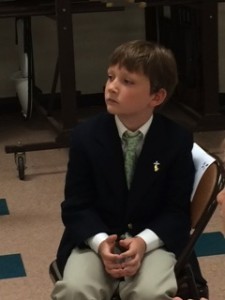
One of my more unruly students, waiting for his First Holy Communion
I think it’s kind of funny that the same culture that thinks seven-year-old kids need a snack in the middle of a sporting event also expects those same kids to top off a six hour school day with 75 minutes of religious instruction. Imagine being in the second grade: word problems, spelling lists, alphabetical order, worksheets! You’re finally sprung at 3 p.m. and race like a pack of uncrated puppies onto the playground… only to be marched over to church to hear the likes of me talk about God. Some days I feel almost as sorry for them as I do for myself.
I’ve taught CCD for nine years. When I tell people that, I feel like a different sort of a person, like maybe a person with a more conservative manner of dress, a clean house and a less colorful vocabulary. People generally think I’m kidding, and they wait for the punch line like I’m going to make C-C-D stand for something wacky. CCD (FYI) stands for Confraternity of Christian Doctrine, which I am sure of because I just Googled it. It’s a weekly religion class that Catholic kids have to go to if they don’t go to Catholic school.
This year I co-taught a class with my friend Emily. They gave us 15 children, 12 of whom are boys, presumably because she is a world-class athlete and I’m paying off a staggering karmic debt. I only know a few things about little boys, and one of them is that they cannot sit for very long. If at all. Asking little boys to sit and listen at 3:45 in the afternoon is like asking a coop full of chickens to perform Swan Lake. There are phrases that we repeat constantly: Please sit back down. Please get off the desk. We can talk about who’s lost the most teeth if there’s time at the end of class. (The rate of tooth loss at this age is alarming). Yes, that clock on the wall is actually moving.
I’m not at all prone to self-sacrifice, so I wouldn’t keep at it year after year if there wasn’t some sort of a payoff. I like teaching CCD in that same way you might like camping. It seems like a shiny, wholesome idea at first. You over-prepare and purchase a bunch of supplies that you don’t really know how to use. You slog your way up a mountain, trying to ignore the blister that is forming at the back of your wet sneaker. You want to give up, because really why in the world would you put yourself through such torture? In your darkest moments, you’re worried that someone’s going to get hurt. Teaching CCD is actually exactly like that. With 15 kids strapped to your back.
But then something happens, an unexpected view or a shooting star. Sometimes they’ll surprise me by connecting a complicated concept like forgiveness to their own lives. Or they’ll start to understand God as someone good, as a part of themselves and everything around them. I once had a student who noticed how the leaves come back on the trees to give us shade just in time for the hot summer. “God is thoughtful,” she said. I caught my breath at that unexpected view.
The first class I ever taught is now finishing the 10th grade. I ran into one of the girls from that class on Mothers Day, and I had to get on my tippy toes to say hello to her. I remember her six-year-old face, terrified, on the very first day. I remember when she got a new puppy and brought him into class to show me. When she’s 50, I’ll look at her and remember that face and that puppy.
This year’s merry band of maniacs just had their First Holy Communion. As the ceremony was starting, one of the boys gave me a hug before he’d had a chance to think better of it. Call it Stockholm Syndrome if you want, but I will remember that hug and every single tooth he lost this year when I see him dressed up again for the prom. The trek’s been totally worth it.
May 15, 2014
Parking Lot Civility
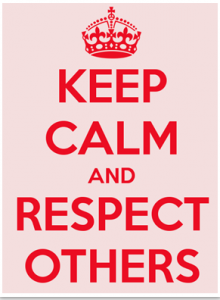 When I first heard about the Rye Civility Initiative, my first thought was: Boy, do I live in a town with high-class problems! I mean are we really going to start worrying about something as nebulous and old fashioned as civility? How about a Fix the Potholes Initiative? Or a Teach Everyone How to Use the Traffic Circle Initiative? I’m even willing to head up the Put Your Phone on Silent in The Nail Salon Initiative if I can garner enough support. But I’m starting to think that encouraging civility is a huge step to solving all of those problems and more.
When I first heard about the Rye Civility Initiative, my first thought was: Boy, do I live in a town with high-class problems! I mean are we really going to start worrying about something as nebulous and old fashioned as civility? How about a Fix the Potholes Initiative? Or a Teach Everyone How to Use the Traffic Circle Initiative? I’m even willing to head up the Put Your Phone on Silent in The Nail Salon Initiative if I can garner enough support. But I’m starting to think that encouraging civility is a huge step to solving all of those problems and more.
When I’m walking through my happy day in my friendly town, nothing could be easier to muster than civility. I chat with the smiling lady who’s telling me she liked my last article, and I think what’s not to respect? Let me into the left hand lane or return my lost cell phone, and you can be sure I’ll respect the heck of you. Civility really becomes relevant and critical at times of tense disagreement, when emotions run high and much is at stake. Like in a parking lot.
Last week I was at the YMCA, doing my granny run with just enough time before I had to get home, shower and get to a meeting. When I got to the parking lot I found that a car had parked behind me, and the driver had forgotten to leave her keys with the valet. The attendant went inside to try to find her, but apparently she had decided to leave the gym and do a few errands in town. She’d gone walkabout, as it were, and took my morning with her. I was literally stuck, boxed in, and boxed out of the shower-meeting portion of my day.
What do you say to a person in this situation? This is where the notion of mindful, deliberate civility is critical, when maybe the warm fuzzies for your fellow man are not flowing so easily. Is there an easy way to internalize civility so that you rely on it like a habit when you’d rather fly off the handle?
George Washington tried to give us guidelines for living a civil life in The Rules of Civility and Decent Behavior in Company and Conversation. (There is a rather civil debate on the Internet as to whether he wrote these rules or copied them.) I didn’t happen to have my copy handy in the YMCA parking lot but the first of these rules is, “Every action done in company, ought to be with some sign of respect, to those that are present.” Then there’s lots of stuff about not taking your clothes off in public and how much and where you should eat and drink. They conclude with the 110th rule, which reads, “Labor to keep alive in your breast that little spark of celestial fire called conscience.” Bingo. I think our forefather was directing us to the two critical ingredients of civility: respect and awareness. Look inward with honesty and look outward with compassion.
In the YMCA parking lot I was wholly focused on my own interests. I’m going to miss my meeting. I’m going to miss my shower. I’m really sweating here. How could this woman do this to ME? Since I was already so involved with myself, I decided to look a little closer. Yes, I too sometimes do thoughtless things that inconvenience others. I sometimes forget to signal or don’t notice that the light has changed. I sometimes stop my car in the middle of the street to chat with a friend and fail to notice the cars lined up behind me. There’s more, but you get the idea.
It was a humbling exercise, and by the time I finished my self-examination I was feeling pretty darn civil. If I can figure out how to make this a habit, then maybe I can keep it together the next time someone parks so close to me that I have to crawl through my trunk to get into my car. Because, guess what, I sometimes park like an idiot too.
All of this makes me think that maybe the Rye Civility Initiative is the most important thing happening in our town right now. The overriding vibe of mutual respect that comes from civility is good for everyone, and it’s even key to furthering our own self-interests. If you want your words to be heard and understood, choose civil ones. Calling the guy at the city council meeting a big fat dope isn’t the fastest way to bring him around to your way of thinking.
Interestingly, an addendum to George Washington’s Rules of Civility was just found on the underside of his flip desk, revealing three more timeless guidelines:
111. When quitting your carriage, endeavor to occupy only the number of parking spaces that corresponds to the number of carriages you are currently driving.
112.Do not become exasperated with the elderly person in front of you who is struggling with the self-checkout at Ye Olde Stop and Shop.
113.Be fastidious in your commitment to putting soiled socks in the hamper.
To find out more about the Rye Civility Initiative, visit www.civilityinitiative.org. Or find them on Facebook for civil inspiration.

